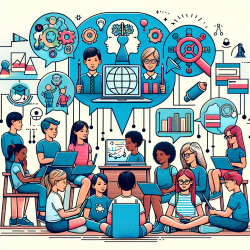In the world of speech-language pathology, creating effective and inclusive learning environments for children is paramount. The recent research article "Investigating Undergraduate Biology Students’ Science Identity Production" offers valuable insights that can be applied to enhance online therapy services provided by TinyEYE. By understanding and implementing the findings from this research, practitioners can improve their skills and foster better outcomes for children.The study emphasizes the importance of identity production in educational settings. Identity production is a complex process where individuals determine who they are through internal dialogue and sociocultural participation. This concept is crucial in speech-language pathology as children’s identities significantly impact their learning experiences and willingness to engage in therapy.Here are some key takeaways from the research and how they can be applied to online therapy:
1. Recognize and Validate Children's Identities
The research highlights the importance of recognizing and validating students' identities to foster a sense of belonging. In online therapy, practitioners can:
- Encourage children to share their personal stories and experiences.
- Validate their feelings and perspectives, making them feel seen and heard.
- Incorporate culturally relevant materials and activities that reflect the diverse backgrounds of the children.
2. Foster Positive Perceptions and Experiences
The study found that positive experiences and recognition by others as community members significantly influence identity production. To create positive experiences in online therapy:
- Provide consistent positive reinforcement and celebrate small achievements.
- Create interactive and engaging therapy sessions that make learning fun.
- Encourage peer interactions and group activities where children can support and recognize each other’s progress.
3. Address and Challenge Deficit Thinking
Deficit thinking, the belief that some children are less capable based on their identities, can hinder progress. Practitioners should:
- Avoid making assumptions about a child’s abilities based on their background.
- Focus on each child’s strengths and potential rather than their limitations.
- Provide equitable opportunities for all children to succeed and excel.
4. Promote Self-Recognition and Empowerment
Self-recognition as a capable learner is crucial for identity production. In online therapy, practitioners can:
- Help children set and achieve personal goals, fostering a sense of accomplishment.
- Encourage self-reflection and self-assessment to help children recognize their progress.
- Empower children by involving them in decision-making processes related to their therapy.
Encouraging Further Research
While the insights from this research are invaluable, it is essential to continue exploring and understanding the complexities of identity production in various educational contexts. Practitioners are encouraged to stay informed about the latest research and incorporate evidence-based practices into their therapy sessions.To read the original research paper, please follow this link:
Investigating Undergraduate Biology Students’ Science Identity Production.










